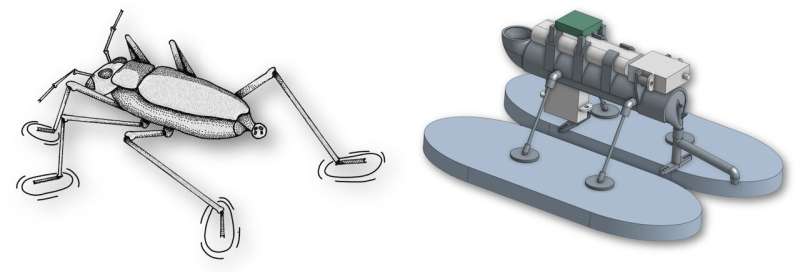Hassan Masoud and his team, including doctoral student Mitchel Timm, built a robot that can manipulate surface tension to propel itself across the liquid surface with great speed and maneuverability. Credit: Mitchel Timm/Michigan Tech
From birds in the sky to fish in the sea, nature's creatures possess characteristics naturally perfected over millennia. Studying them leads engineers to create new technologies that are essential to our way of life today. Mechanical engineers from Michigan Technological University share how they built a tiny, self-powered robot inspired by water-skimming insects.
"Bio-inspired robotic technologies push the boundaries of what we think is possible when it comes to traveling on land, in the air and underwater," said Hassan Masoud, an expert of biological and bio-inspired fluid mechanics at Michigan Tech. "Yet few robots focus on the air-water interface. Many biological organisms such as insects, arachnids and even bacteria have the ability to stand upon this boundary by taking advantage of surface tension."
However, among these species, only a few can also manipulate surface tension to propel themselves across the liquid surface with great speed and maneuverability. Masoud and his team, including doctoral student Mitchel Timm, built a robot that can do this—and their work was recently published in Bioinspiration and Biomimetics.
A Marangoni robot moves across the surface of water. Credit: Michigan Tech
They also wrote a guest blog for Michigan Tech's Unscripted research blog detailing how their robot uses Marangoni propulsion, a method of generating thrust by creating surface tension gradients.
More information: Mitchel Timm et al, A remotely controlled Marangoni surfer, Bioinspiration & Biomimetics (2021). DOI: 10.1088/1748-3190/ac253c
Journal information: Bioinspiration and Biomimetics
Provided by Michigan Technological University
























